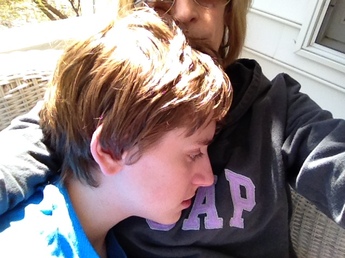
No one likes to go to funerals. Funerals are sad. Funerals are depressing. Funerals are a reminder of our own mortality and how fleeting life really is. Even though we don't like to go to funerals, even though we don't want to go, and even though we try and contrive any excuse possible as a way not to go, most of us don something black and show up anyway because it is the "right" thing to do.
We may have ongoing battles in our head as to whether or not we should attend the funeral. "Well, I didn't know him that well, but, I use to work with his wife ten years ago." Or "I can't go, I have to ______ (insert any word here from "work", to "skydive", to "wrestle alligators") and the family probably won't expect me to go anyway." And my own personal, I hate funerals go to, "I think it's just for close family and friends.". Whatever battle wages on inside my head, "supporting the family" usually wins out for me, and off I go, dread in my heart, tissues in my hand.
As I attended my second funeral in four days last week, I watched the Funeral Director who has officiated every funeral I have attended since I was a child, and I wondered, how does he do it? Such sadness, day in and day out. Grieving families and friends tending to matters their hearts want nothing to do with, but, handling the affairs anyway because their brain insists they must. I guess Funeral Directors recognize what most of us try not to think about, that death is a part of life. Death is inevitable. Death happens to all of us. I'm not implying that Funeral Directors have a lack of compassion, in fact, to do that job, I think you would need to be very compassionate, but, I think you also have to see death in a much more concrete, literal way.
I believe like a funeral director, Ryan gets the black and white version of death. Death is a part of life. Death is a part of nature's life cycle. Death is inevitable. Death is gone. The ambiguity, the abstract ideas of death, well, that is much harder for Ryan to understand.

Later, when I asked Ryan if he wanted to attend the funeral services, with total panic and horror glimmering through his own watery eyes, he yelled, "No, I can't handle it Mom. My body can't handle it. Please don't make me go.". I calmed Ryan down and assured him that he did not have to go. Relief washed over his face, as his body visibly relaxed. Ryan told me, in no uncertain terms, that he decided he would "never attend another one of those for the rest of his life." AWEnestly, who can blame him? Wouldn't that be the choice we all would make, if it were as simple as not wanting to go?
Understanding and processing death is difficult for all of us. When you add the black and white, concrete, literal thinking of someone with autism, processing and understanding death is even tougher.
In the movie, Temple Grandin, produced by HBO, Temple (played AWEsomely by the fabulous Claire Danes), asks the question most of us at some point and time have wondered, "Where do they go?". After seeing her favorite horse at boarding school die, Temple asks her teacher, "Where do they go?". The question comes up again, after watching cattle die at a slaughter house, "It was here, and now it's gone. Where does it go?". And yet again, at the funeral of her beloved teacher, Temple asks her mother, "Do you know where they go?". To which her mother says, "No". At that point, Temple decides to leave the funeral because in her concrete, literal thinking way, she declared, "I said goodbye when I saw him. He's not there. I've got him in my mind.". What a perfectly AWEsome, yet literal way to process death.

Ryan's literal mind struggles with terms such as, "passed away" or "lost" and overhearing such words, in what appears a cold, rude manner, Ryan may say, "They are not lost, they are dead.". "Passed away" is ambiguous and "lost" is not "dead". These words surrounding death, make no sense to him.
Although many tears are shed at a funeral or memorial service for someone who has died, there often are smiles and laughter over good times and memories being recalled by loved ones. That laughter may confuse Ryan since after all, death is gone, death is final, death is sad, so why are people laughing? The emotions that go along with grief can be confusing for someone who struggles to process the emotions of others and who struggles to read the various facial expressions and body language that are part of such an emotional time.
The two funerals Ryan has attended, I worried. I worried in Ryan's confusion to understand death, that he may say something inappropriate, like "Where do they go?". I worried that Ryan may behave in a way others would deem rude or disrespectful, like scripting a television show or video game in a silly voice rather than offering heartfelt condolences in his Ryan voice. There is a lot of hugging and touching at such a sad time, and Ryan does not care to be hugged by strangers. All of these things could lead others to believe that Ryan was demonstrating less than funeral appropriate behavior.
You see that confusion, that type of behavior, those comments may be acceptable if demonstrated by a young child, but, since you can't "see" autism, when such "inappropriate" or "wrong" behavior is displayed by someone who is "old enough to know better", it's hard as parent not to show others judging Ryan how "wrong" they are, even at a funeral. This is why I worried. Fortunately, at both funerals, Ryan proved me wrong and did his best to be patient, kind and sympathetic.
For many people when a loved one dies, religious and spiritual beliefs come into play, and these belief are equally as vague and abstract as the concept of death and dying. To try and explain a soul or heaven, something such a visual, literal person can't "see", is hard for them to understand. "If Jesus came back to life, why can't so and so?". "If God loved so and so, then why did He let them die?". Questions difficult to answer, answers difficult to understand.
I may not be able to answer all the questions that are circling in Ryan's brain when it comes to death, and I may not ever be able to answer the big question, "Where do they go?" in a way Ryan can fully understand, so rather than focus on where they "went", I try and focus on where they "are". I try to explain to my visual boy, with his photographic memory, that where those we lost are, is in our mind. We can still see them through pictures our brain took when we think back to a happy memory we have. And recalling those pictures, helps us miss them a little bit less. As I explained this, I watched my son's face light up, recalling the pictures he has stored in his amazing brain, of our beloved neighbor who always greeted Ryan with a warm smile, regardless of how many times she was ignored in return. I watched the confusion and sadness slowly fade away, being replaced with understanding and joy....and a picture in his mind.
I am ill-equipped to answer, "Where do they go?", however, I am equipped to answer where they "are". I can remind Ryan of all the places our friend or family member had been, of all the places we went together and of the all the good times we shared. I can assure Ryan that no matter how much time passes, we can always "see" them in the pictures lovingly stored in our mind and "feel" them in the love we have in our heart. Isn't knowing where they "are" comforting to our grieving, sad heart?
As with so many things in life, even when it comes to death, trying to help Ryan and his AWEsome brain understand something so troublesome, I wind up being the one learning from him.



 RSS Feed
RSS Feed
